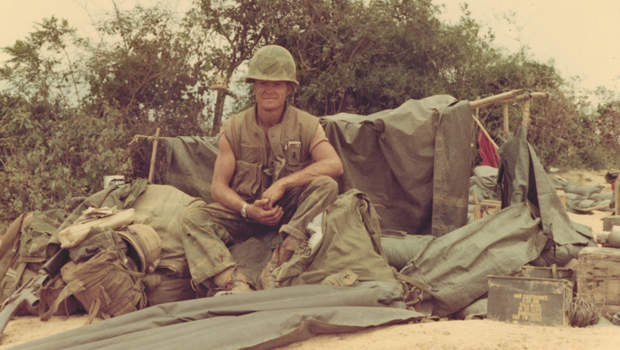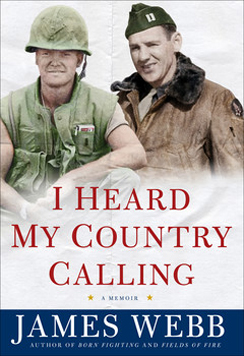James Webb: A Marine's impassable divide
A veteran who answered the call of duty nearly a half-century ago has been trying to serve his country ever since, through the written word and through his public service as well. This morning he talks to David Martin:
In 1969 James Webb was a lean, mean fighting machine -- a Marine lieutenant in Vietnam, living a grim, almost sub-human existence of patrols and ambushes, sleeping on the ground and drinking water from bomb craters.
When he gets together with his fellow officers from back in the day, they sing a little ditty of their time in Vietnam:
"And it's off to Vietnam,
lose a leg or lose an arm,
and be pensioned by the Corps for ever more."
It's a far cry from "Halls of Montezuma," noted Martin.
"I think it kind of fits," laughed Webb. "Marine Corps gallows humor."
The Marines suffered more killed and wounded in Vietnam than in any other of America's wars, including World War II.
"In 1969, the year that I was in Vietnam, we lost twice as many American dead as we have lost in Iraq and Afghanistan combined, in the entire war in both those countries," Webb said.
No Vietnam veteran has written more thoughtfully about his experiences than Webb -- first in 1978 with the novel "Fields of Fire," which became a bestseller at a time when nobody wanted to hear about the war.
"There had been nothing yet that was written that attempted to preserve the dignity of the people who served," he said, "and so I was turned down by, I think, a dozen publishers."
"At one point in the book, one of your characters says, 'We just went around the bush and then we left.' Was all that misery and death pointless?" Martin asked.
"No, I don't think it was pointless," said Webb. "No. I think the people who stepped up to serve their country during a very difficult time need to be honored for it."
That same fierce pride of service animates his newly-published memoir, "I Heard My Country Calling," published by CBS' Simon & Schuster.
"The people who were with us in the Marine Corps largely are the finest people that I've ever met," he said.
The book is about more than Vietnam. It's about growing up in a military family where the father, an Air Force pilot, was often gone on missions like the Berlin Airlift. Webb said as a child he'd take a picture of his dad to bed with him every night.
He wrote his memoir in an office overlooking Washington and the Iwo Jima Memorial, that great symbol of American valor. He has his own mementos from that savage World War II battlefield -- literally sands of Iwo Jima, and one of the rounds that was fired during the battle.
His office is only a short walk from Arlington National Cemetery, where he frequently goes with his wife. On May 9 they visited the grave of Corporal James Ward, and offered a salute.
"I visit this grave every year on this day, yeah," Webb said. "The day that he was killed in action, yes."
"And he was under your command?" asked Martin.
"He was a squad leader, he was a very fine Marine. We recommended him for the Congressional Medal of Honor when he was killed. He received the Navy Cross, the second-highest award our country can give."
Webb also received the Navy Cross for his service in Vietnam, during which he suffered wounds that forced him to retire from the Marine Corps.
He went on to become a Secretary of the Navy under President Reagan, and a one-term Democratic senator from Virginia.
But Vietnam keeps pulling him back . . . back to the fields of fire, back to a place the Marines called Arizona Valley.
"I think what happened to the villagers is the greatest tragedy of the war," said Webb.
"Did you do them any good while you were there in 1969?" Martin asked.
"We did our job, you know."
"Did that do them any good?"
"I'm not so sure."
Webb's son went with him on one trip, and afterwards enlisted in the Marine Corps.
"My son served in Iraq. He was a Marine lance corporal, an infantry guy, in Ramadi during some of the worst fighting of the war."
It was a war then-Senator Webb vehemently opposed.
"It's hard to be in combat, but emotionally there's nothing harder than having your kid in combat and not knowing, every morning not knowing whether he's alive," said Webb.
When President Bush asked Webb how his son was doing, Webb frostily replied, "That's between my boy and myself," an incident Webb refuses to explain: "Well, let's just say maybe he and I both had a bad day."
But which is easy to understand when you read this passage from his memoir:
"I and my fellow combat veterans stand on one side of a great impassable divide, with the rest of the world on the other."
"There's a great Marine Corps saying," said Webb. "'If you were there, I don't need to explain it to you, and if you weren't there, I can't explain it to you.' That's the divide."
But he can explain the meaning of Arlington Cemetery, where his parents are buried just a few rows down from that young Marine corporal he lost in Vietnam.
"The enormity of this place is what I love," Webb said. "And the notion that this is our national shrine to military service and sacrifice. I can get lost in this place for hours and see the stories, the headstones of people you'll never even know who they are, and that's every bit as important to me as my own family."
And then there are the words inscribed on Arlington's Confederate War Memorial: "Not for fame or reward, not for place or for rank, not lured by ambition or goaded by necessity, but in simple obedience to duty as they understood it."
"And every single person who has stepped forward to go to a place like Afghanistan or Ramadi or Vietnam," said Webb, "deserves that respect."
For more info:
- "I Heard My Country Calling: A Memoir" by James Webb (Simon & Schuster); Also available in eBook, Unabridged Audio Download and Unabridged POD formats

